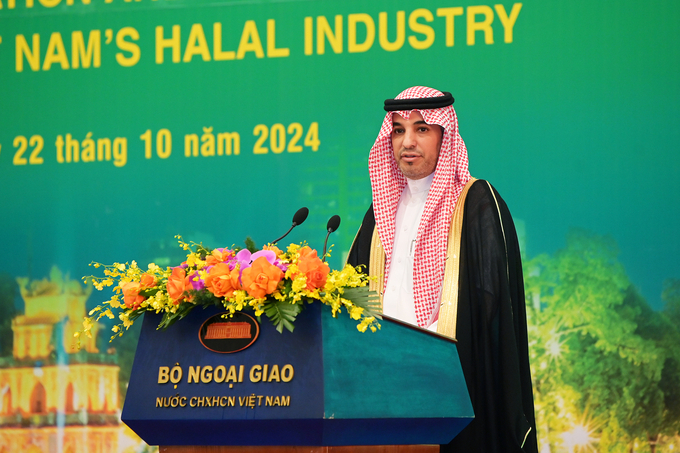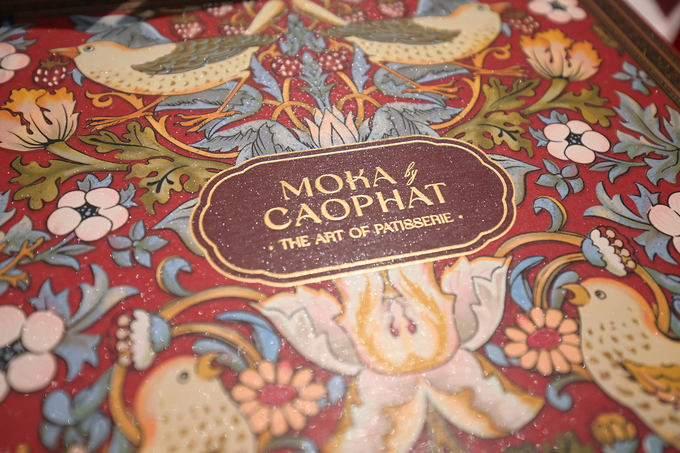November 23, 2025 | 18:38 GMT +7
November 23, 2025 | 18:38 GMT +7
Hotline: 0913.378.918
November 23, 2025 | 18:38 GMT +7
Hotline: 0913.378.918
International partners consider the establishment of the Vietnam Halal Certification Authority (HALCERT) in April of this year to be a significant milestone in the improvement of Vietnam's position in the global Halal economy.
Vietnam's adoption of Halal certification establishes it as a reliable supplier of Halal products, thereby creating new opportunities for Vietnamese manufacturers in the international market. Dr. Yousif S. AlHarbi, Vice President of the Saudi Halal Center, stated that this initiative not only fosters development in the Halal sector but also contributes to the overall success of Vietnam's export-oriented economy.

Dr. Yousif S. AlHarbi, Vice President of the Saudi Halal Center, shares his desire to build a Halal ecosystem with Vietnam. Photo: Tung Dinh.
Although Halal standards are relatively new to Vietnam, the fundamental principles they represent—including purity, ethics, and respect for nature—are deeply rooted in Vietnamese culture.
The Saudi Halal Center's leadership observed that the Vietnamese statement "Eat clean, live well" is completely consistent with the fundamental principles of Halal. It underscores the importance of consuming food that is both beneficial for our health and well-being and that is free of contaminants.
Vietnam has an exceptional opportunity to expand its products in the global market and seamlessly integrate Halal principles as a result of this alignment of values.
Dr. Yousif S. AlHarbi believes that the global Halal economy's expansion is reliant upon international cooperation. He emphasized Saudi Arabia's dedication to collaborating with Vietnam to establish a strong Halal ecosystem.
"By closely collaborating with Vietnamese authorities, we aim to ensure that Halal certification in Vietnam not only meets standards but is also recognized internationally, thereby helping Vietnamese products access new markets and expand the country’s export capabilities," stated the Vice President of the Saudi Center for Halal Certification.
Therefore, this partnership will provide Vietnam with the necessary technical expertise and resources to fulfill the increasing global demand for certified Halal products.
Furthermore, these initiatives will contribute to the economic development of both nations, improve food security, and advance the shared principles of sustainable and ethical production.
"Our goal at the Saudi Halal Center is to serve as the global leader in the unification and advancement of the Halal industry. We are committed to fostering the development of a robust Halal infrastructure that benefits both producers and consumers by establishing bridges between nations," emphasized the agency's leadership.
In the context of Vietnam's rise as a significant participant in the global Halal supply chain, Vietnam is in an advantageous position to become a significant center for Halal-certified ingredients and products due to its commitment to quality, strategic geographic location, and availability of resources.
By integrating halal principles into its production processes, Vietnam can generally produce products that appeal to a diverse global consumer base, extending beyond the Muslim market.
Vietnam is presently one of the most dynamic economies in Asia, with continuous and robust development. The Halal industry is creating tremendous opportunities for Vietnam. Nevertheless, the maximum potential of the Halal industry can only be achieved by adhering to the certification inspection processes for Halal certification and adhering to common standards.
According to a representative from the Standards and Metrology Institute for Islamic Countries (SMIIC), this is the ideal opportunity to emphasize the institute's significance. The Organization of Islamic Cooperation (OIC) established SMIIC in 2010 to establish a global Halal standards system that is unified.

Vietnam has many high-quality products that are favored by Halal consumers, but it needs to strengthen Halal certification efforts. Photo: Tung Dinh.
Certainly, the implementation of unified Halal standards within the Halal industry will foster economic development, innovation, and the establishment of a new era of global partnerships in Vietnam. Consequently, Vietnam's continued sustainable development in the Halal sector will be contingent upon its adherence to OIC/SMIIC standards in order to effectively integrate into the global Halal ecosystem..
Ihsan ÖVÜT, Secretary-General of SMIIC, noted that the organization presently has 17 technical departments that are working to develop and refine OIC/SMIIC standards to satisfy the needs of the Halal industry. International practices adhere to the most professional procedures when compiling the OIC/SMIIC standards.
"The Halal industry has been the subject of 20 standards, which we have issued as of 2024. These standards encompass a variety of sectors, including Halal cuisine, additives, tourism, gelatin, Halal management systems, animal feed, pharmaceuticals, and the supply chain", Ihsan ÖVÜT Secretary-General, also stated.
Additionally, they are engaging in standard projects that address other Halal industry concerns, including the establishment of Halal meal standards on ships, the identification of pork-containing products, Halal packaging, health care in line with Halal tourism services, Halal medical tourism, and the incorporation of Islamic ethics and values into Halal management systems. Consumers should anticipate the imminent release of these standards.
It is clear that a unified standards system not only fosters consumer trust but also levelizes the playing field for businesses, thereby facilitating cross-border trade activities. This method will facilitate the independence of Halal certification from the recognition systems of individual countries, while simultaneously fostering global standards of transparency, consistency, and trust.
With 47 members from four continents, SMIIC is paving the way to building a unified and robust global infrastructure for Halal standards.
Translated by Linh Linh
/2025/11/21/4309-2-153400_128.jpg)
(VAN) Green and low-emission rice is paving the way for Vietnamese rice to enter high-end markets, marking the beginning of a transformation journey toward greening and elevating the national rice brand.

(VAN) ‘Right to Win’ outlines a national action plan that shapes a new vision for Viet Nam’s agriculture in an era of renewal and global integration.

(VAN) Lam Dong’s farmed sturgeon output this year is expected to reach 2,300 tons, worth VND 450 billion, affirming the brand’s position on the market.

(VAN) A surge in Ukrainian egg exports, largely driven by soaring sales to the UK over the last few years, has notably pushed up egg prices on the domestic market.

(VAN) The price of Arabica Catimor coffee in Quang Tri is currently at VND 25,000–27,000/kg (fresh cherries), the highest level ever recorded

(VAN) 'From the coffee story, we can think deeper and further about the crop production sector - from development orientations and value-chain organization to international integration,' assessed Dr Le Quoc Doanh.
/2025/11/18/2431-0-161627_248.jpg)
(VAN) Viet Nam accounts for 43% of the world's export volume of Robusta coffee. However, the Vietnamese Robusta coffee brand has yet to gain broad recognition on the global market.